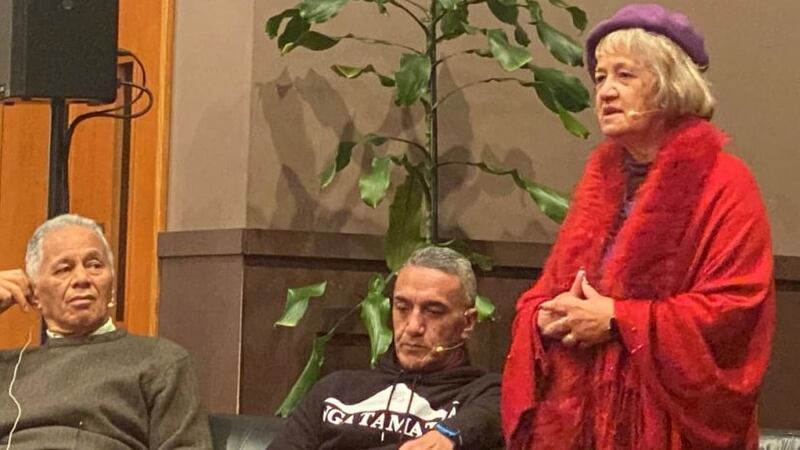Hana Te Hemara's sister Ramari Maipi (R) was on the panel with her son Wheeti and original Ngā Tamatoa members including Taura Erurea (L). Photo / LDR
Members of Ngā Tamatoa have urged Māori to get active in local government to tackle racism and get land back.
In the 1970s Ngā Tamatoa (the Young Warriors) championed high-profile campaigns like the 1972 Māori language petition, the start of annual protests at Waitangi, and the 1975 land march and 'tent embassy' at Parliament.
This week they marked 50 years since their petition for te reo to be taught in schools was presented at Parliament.
Photo:
At a panel discussion in Ngāmotu, Morehu McDonald said Ngā Tamatoa had focused on central government, but now a "racist Pākehā power political structure" in local government needed to be dismantled.
"Because a lot of [our] lands are tied up in the local government and the regional governments… We really need to start moving our focus on getting our people in there, while we've got the Māori ward systems."
He said the future generation needed to get politically activated.
"Take on the local people that you may have grown up with as your friends, as whānau, living in the same community. But know they have come from a different power structure that has totally upheld the white power structure and white culture in this country."
The panel moderator Ngamata Skipper responded that Taranaki was proud that whānau had put up their hands for all five Māori ward seats.
"The local council is one thing: regional councils are exactly the same beast," she said.
"We know that a lot of our resources are held in those organisations… You've probably hit the nail on the head in terms of power structures and what needs to be disrupted."
Leilani Ohia, the daughter of two original Ngā Tamatoa members, agreed young people needed to be more politically aware.
"Our tamariki are ready, our generations are amazing, are ready to take those places in the local councils… It's time. We know those systems now."
Des Kahotea said in the years since Ngā Tamatoa Māori had dealt with Treaty settlements and Resource Management Act consultations despite a lack of capacity.
"What I see, what I'm dealing with all the time, is people my age are involved in consulting with local government - RMA all that stuff - and they're not up to it, they're not professional."
Kahotea said the tertiary-educated expertise of many young Māori must be turned around to help their people.
"[It's about] supporting the next generation and having a succession plan, so when the next generation takes over they're really prepared and working at full capacity."
Orewa Barrett-Ohia cautioned that Māori in politics had often not listened and responded to their people.
"This happens a lot when we're talking about local politics or regional politics, people go up with a heavy agenda… and if they don't read what people are wanting, or hear it, they often trip up - they don't go far."
The panel discussion was part of 'I am Hana,' a week of events commemorating the 50th anniversary of the Māori language petition.
'I am Hana' was presented by Te Kotahitanga o Te Atiawa; Ngāti Te Whiti and Puketapu hapū; New Plymouth District Council; and the whānau of the late Hana Te Hemara (Te Atiawa, Ngāti Raukawa, Ngāi Tahu), a founding member of Ngā Tamatoa.
Hana's nephew Wheeti Maipi said people misunderstand what 'by Māori for Māori' means.
"They think that this is only for Māori and they're going to be the only ones that benefit, but it'll be good for everyone, it's going to benefit the whole country."
Morehu McDonald said future leaders needed to be clear that Treaty settlements were not full and final.
"We have to start saying now the settlements that have been done were unjust, they did not give sufficient return of lands. In fact, every claim had to pay for our own whenua out of our own settlement money."
"We should start now signalling to the Crown, it doesn't matter how long it takes, we reject these settlements as full and final - and then we can start the whole process again so we do get our lands back."
"Ka whawhai tonu mātou, ake ake ake."
Taura Eruera said their activism in the 70s was one thing, but Ngā Tamatoa was also an idea.
"1970-81 was one expression of that idea, one character, one generation's carrying of that idea."
"We were tamatoa, you are your own kind of toa."


